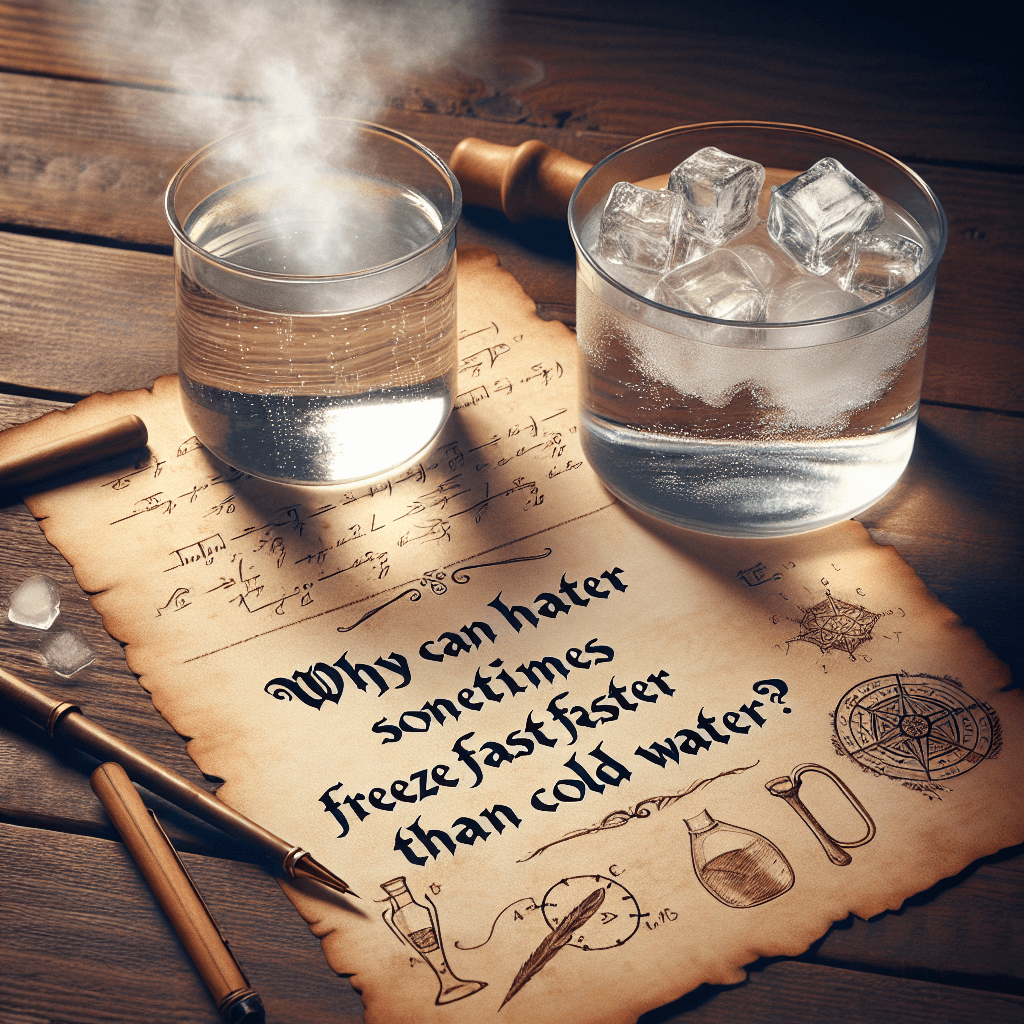The Mpemba Puzzle: Why Hot Water Can Freeze Faster Than Cold
It defies intuition, but sometimes hot water freezes faster than cold water. This phenomenon, known as the Mpemba effect, has puzzled observers for centuries.


Too Long; Didn't Read
The Mpemba effect is the counter-intuitive observation that hot water can, under certain conditions, freeze faster than cold water.
The Mpemba Puzzle: Unveiling Why Hot Water Can Sometimes Freeze Faster Than Cold Water
Imagine placing two containers of water in a freezer – one filled with hot water, the other with cold. Intuition tells us the cold water should freeze first. But what if the hot water wins the race? This counter-intuitive phenomenon, the Mpemba effect, has intrigued observers for centuries, with notes dating back to Aristotle. While it doesn't happen every time, the observation that hot water can indeed sometimes freeze faster than cold water is a fascinating scientific curiosity. This post explores the scientific explanations behind this surprising observation.
Unveiling the Mpemba Effect: A Chilly Conundrum
The Mpemba effect describes the observation where, under specific conditions, hotter water freezes faster than colder water. While ancient philosophers like Aristotle noted similar phenomena, the effect gained modern prominence in the 1960s. A Tanzanian schoolboy, Erasto B. Mpemba, observed that hot ice cream mix froze faster than cold mix. His persistent inquiry led to experiments with Dr. Denis G. Osborne, culminating in a 1969 publication that brought the effect to wider scientific attention, sparking decades of research and debate.
The Science Behind the Speed: Potential Explanations
The Mpemba effect's intrigue stems from its lack of a single, universally accepted explanation. Instead, a combination of factors likely contributes, their importance varying with specific conditions. Here are some of the leading theories:
Evaporation's Role
Hotter water evaporates at a faster rate. As water evaporates, the total mass of the remaining water decreases. This reduction in mass means less water needs to cool and freeze, potentially allowing it to solidify faster than the initially larger volume of cold water.
The Impact of Dissolved Gases
Cold water can hold more dissolved gases (like oxygen and carbon dioxide) than hot water. As water is heated, these gases are expelled. Scientists theorize these gases in cold water might alter its freezing point or affect heat transfer via convection, potentially slowing freezing.
Convection Currents in Action
Temperature differences within water create convection currents – warmer water rises, cooler water sinks. Hot water initially has more vigorous convection currents. This enhanced mixing promotes more uniform temperature and faster heat loss from the surface, especially initially, compared to colder water which might stratify and insulate itself.
The Supercooling Phenomenon
Water doesn't always freeze precisely at 0°C (32°F). It can sometimes supercool, remaining liquid below its freezing point. Some research suggests that previously heated water might be less prone to supercooling than water that was initially cold. This might be due to changes in nucleation sites (points where ice crystals form) caused by heating. If cold water supercools significantly while hot water freezes closer to 0°C, the hot water could solidify first.
Frost Insulation
In an open container within a freezer, a layer of frost can form on the surface of the water. It's proposed that colder water might form an insulating frost layer more quickly. This frost could then slow its cooling, allowing the initially hotter water to freeze faster.
The Intricacies of Hydrogen Bonds
More recent and complex theories delve into the behavior of water, specifically focusing on hydrogen bonds – the connections between water molecules. Studies suggest heating alters these bonds, potentially facilitating a more orderly arrangement into the crystal structure of ice upon cooling. This research is evolving and technical.
Not a Universal Rule: The Importance of "Sometimes"
It's crucial to emphasize the "sometimes" in the Mpemba effect. Hot water does not always freeze faster than cold water. The effect is highly dependent on specific conditions. These include:
- Initial temperatures: The specific starting temperatures of the hot and cold water.
- Container properties: The shape, material, and size of the containers.
- Ambient temperature: The temperature of the freezer or surrounding environment.
- Volume of water: The amount of water being tested.
- Purity of water: The presence of dissolved minerals or impurities.
These factors determine which proposed mechanisms (evaporation, convection, etc.) dominate and potentially cause the Mpemba effect. Its sensitivity makes reliable reproduction in experiments challenging. The lack of a single, definitive explanation applicable to all scenarios is why it remains a subject of ongoing scientific inquiry.
Conclusion: A Curious Case of Cooling
The Mpemba effect, hot water sometimes freezing faster than cold, is a captivating testament to surprising complexities in everyday physics. While it defies simple intuition, scientific investigation has proposed several plausible mechanisms, from evaporation and dissolved gases to convection and supercooling. No single theory fully explains it, and its appearance is highly conditional. Understanding this effect demystifies a curious phenomenon and encourages a closer look at our world, where simple processes can hide intricate, unresolved scientific puzzles.


